
Mayo Clinic press
Medical Editors | Paul D. Pettit, M.D., Anita H. Chen, M.D.
Publisher | Daniel J. Harke
Editor in Chief | Nina E. Wiener
Senior Editor | Karen R. Wallevand
Art Director | Stewart J. Koski
Illustration, Photography and Production | Paul W. Honermann, Daniel J. Hubert, Joanna R. King, Michael A. King, Amanda J. Knapp, M. Alice McKiney
Editorial Research Librarians | Abbie Y. Brown, Edward (Eddy) S. Morrow Jr., Erika A. Riggin, Katherine (Katie) J. Warner
Copy Editors | Miranda M. Attlesey, Alison K. Baker, Nancy J. Jacoby, Julie M. Maas
Indexer | Steve Rath
Contributors | Heidi K. Chua, M.D.; Candace F. Granberg, M.D.; Amy E. Krambeck, M.D.; Deborah J. Lightner, M.D.; Cynthia E. Neville, P.T., D.P.T., W.C.S.; John A. Occhino, M.D.; Randina Harvey-Springer, APRN, C.N.P.; Emanuel C. Trabuco, M.D.
Image Credits | The individuals pictured are models, and the photos are used for illustrative purposes only. All photographs and illustrations are copyright of MFMER except for the following: NAME: shutterstock_297786143.eps/PAGE: COVER/CREDIT: SHUTTERSTOCK NAME: shutterstock_1317987359.eps/PAGE: COVER/CREDIT: SHUTTERSTOCK NAME: shutterstock_461056675.jpg/
Published by Mayo Clinic Press
2021 Mayo Foundation for Medical Education and Research (MFMER)
MAYO, MAYO CLINIC and the Mayo triple-shield logo are marks of Mayo Foundation for Medical Education and Research. All rights reserved. No part of this book may be reproduced, stored in a retrieval system, or transmitted, in any form or by any means, electronic, mechanical, photocopying, recording or otherwise, without the prior written permission of the publisher.
The information in this book is true and complete to the best of our knowledge. This book is intended only as an informative guide for those wishing to learn more about health issues. It is not intended to replace, countermand or conflict with advice given to you by your own physician. The ultimate decision concerning your care should be made between you and your doctor. Information in this book is offered with no guarantees. The author and publisher disclaim all liability in connection with the use of this book.
For bulk sales to employers, member groups and health-related companies, contact Mayo Clinic, 200 First St. SW, Rochester, MN 55905 or email .
ISBN 978-1-893005-71-6
Library of Congress Control Number: 2020952435
Some images within this content were created prior to the COVID-19 pandemic and may not demonstrate proper pandemic protocols. Please follow all recommended CDC guidelines for masking and social distancing.
Contents
Preface
This book is intended to be a source of hope and assurance for all individuals who experience bladder and bowel control problems. Our message is that incontinence isnt something that you need to live with. Most incontinence can be improved or cured.
No matter how bothersome your symptoms whether your incontinence is more of an annoyance or its severe enough that youre afraid to leave the house there are steps that you can take to manage or treat the problem. Incontinence shouldnt keep you from enjoying an active life.
A variety of therapies from lifestyle changes to minimally invasive procedures to surgery can help with bladder and bowel problems.
A number of advances have been made in the treatment of both urinary and fecal incontinence. Newer medications have been approved, and additional nonprescription products are now available. Minimally invasive treatments such as bulking agents and Botox injections provide added treatment options. Procedures such as sacral nerve stimulation are seeing greater use. In addition, advances have been made in surgical procedures to treat more-severe symptoms.
We hope this book helps you gain a better understanding of incontinence and that it serves as a guide to effective medical care so that you can lead a full and active life.
Paul D. Pettit, M.D.
Anita H. Chen, M.D.
Medical Editors
 Paul D. Pettit, M.D.,
Paul D. Pettit, M.D., has been a gynecologic surgeon at Mayo Clinic in Jacksonville, Fla., for 35 years. Dr. Pettit is board-certified in female pelvic medicine and reconstructive surgery. He initiated development of the Gynecologic Continence Program at Mayo Clinic in Jacksonville.
 Anita H. Chen, M.D.,
Anita H. Chen, M.D., is a urogynecologist at Mayo Clinic in Jacksonville, Fla. Dr. Chen is board-certified in obstetrics and gynecology and female pelvic medicine and reconstructive surgery.
Getting help
For many people, taking that initial step to treat incontinence is the most difficult part. Where do you go? Who do you see? If you have a primary care provider, making an appointment with him or her is probably a good place to start. Family practitioners, general internists, physician assistants and nurse practitioners often can treat incontinence, especially mild symptoms.
However, not all primary care providers have the interest, training or experience to treat the condition. And some may take the view that incontinence is an inevitable consequence of aging.
If your primary care doctor doesnt seem to have a positive attitude about treating your condition, he or she seems uninformed when discussing the subject, or you just dont feel satisfied that youre receiving appropriate care, you might find it most helpful to see a specialist.
Who specializes in treatment for incontinence? There are a few different options. The specialist you should see depends on the type of incontinence you have and whether youre male or female.
- Female pelvic medicine and reconstructive surgery specialist. This is a newer medical subspecialty. An individual with these credentials is an obstetrician-gynecologist (OB-GYN) or a urologist with additional training in diseases and disorders affecting the female pelvic floor. The pelvic floor is the network of muscles, ligaments, tissue and nerves that help support and control the rectum, uterus, vagina and bladder. A female pelvic medicine and reconstructive surgery specialist previously known as a urogynecologist has passed board examinations in this specialty area and is certified to treat women with complex benign pelvic conditions, lower urinary tract disorders, pelvic floor dysfunction and defecation disorders. You might ask to be referred to such a specialist if an individual with this type of training is available within your care network.
- Obstetrician-gynecologist. Obstetrician-gynecologists (OB-GYNs) are trained in caring for women. Many can manage or treat simple types of urinary leakage. If there isnt a female pelvic medicine and reconstructive surgery specialist at your clinic or hospital, you may want to see an OB-GYN.
- Urologist. A urologist specializes in male reproductive organs and urinary disorders in both men and women. Men with urinary incontinence generally are treated by a urologist.
- Gastroenterologist. A gastroenterologist is trained to treat conditions of the digestive (gastrointestinal or GI) tract in both men and women including fecal incontinence. You may see a specialist known as a motility specialist within the gastroenterology department. This individual has expertise in conditions that interfere with the coordinated contractions that move food and waste through the digestive tract.
Next page
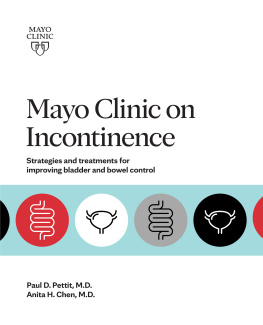

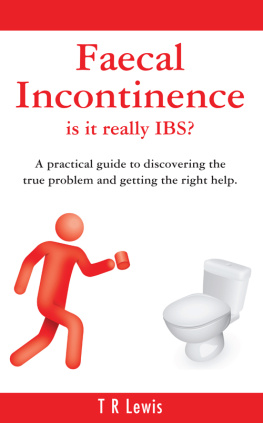
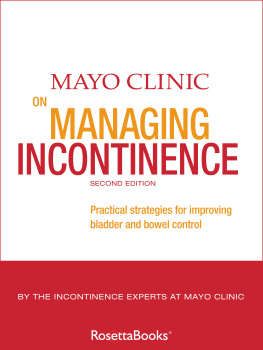
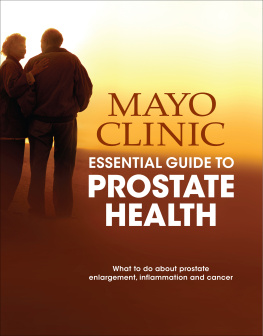

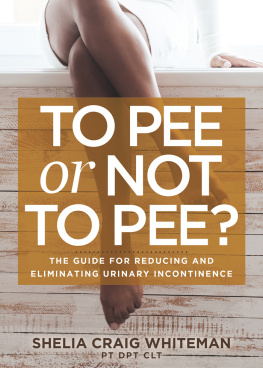

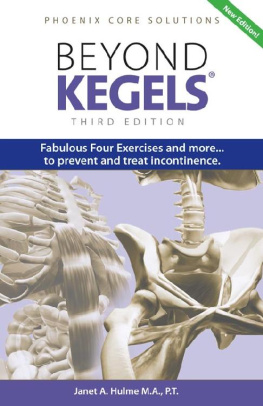

 Paul D. Pettit, M.D., has been a gynecologic surgeon at Mayo Clinic in Jacksonville, Fla., for 35 years. Dr. Pettit is board-certified in female pelvic medicine and reconstructive surgery. He initiated development of the Gynecologic Continence Program at Mayo Clinic in Jacksonville.
Paul D. Pettit, M.D., has been a gynecologic surgeon at Mayo Clinic in Jacksonville, Fla., for 35 years. Dr. Pettit is board-certified in female pelvic medicine and reconstructive surgery. He initiated development of the Gynecologic Continence Program at Mayo Clinic in Jacksonville. Anita H. Chen, M.D., is a urogynecologist at Mayo Clinic in Jacksonville, Fla. Dr. Chen is board-certified in obstetrics and gynecology and female pelvic medicine and reconstructive surgery.
Anita H. Chen, M.D., is a urogynecologist at Mayo Clinic in Jacksonville, Fla. Dr. Chen is board-certified in obstetrics and gynecology and female pelvic medicine and reconstructive surgery.